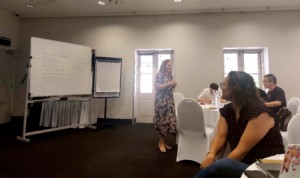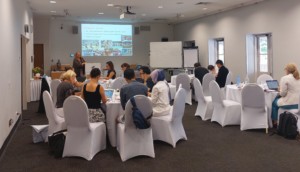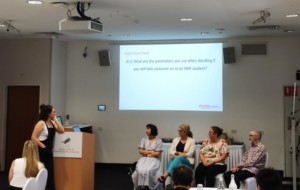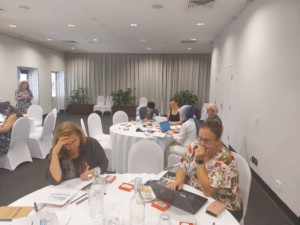On Friday 24th of February, some of the Mount Gravatt HDR students hosted a writers’ retreat at the Ship Inn on Southbank Campus. This retreat was designed by HDR students for HDR students and funded with support from GIER and emerged from conversations in the OWL group (other writing lab). The OWL group members gather fortnightly to work together on their writing skills. People are welcome to reach out and join the OWL group if they are interested. The group read each other’s work and provide feedback as well as experimenting with different types of writing work. This group’s gatherings were the starting point of a fascinating journey.
The OWL discussed having a writer’s retreat that responded to their needs in a more personalised form. They brainstormed ideas to include during the day. After developing a draft, they consulted with their supervisors, Professor Parlo Singh and Dr Sue Whatman, about funding possibilities and whether the project might be useful for others. Professors Singh and Whatman encouraged the students to pursue the project, and GIER was able to help and support their efforts by funding the writers’ retreat.
After months of contacting potential speakers, organising activities and collaborating during the finetuning of the event, the OWL group finally held their first writing retreat last week. The day started with a brainstorming activity around procrastination. Participants shared their ideas for worthy ways to avoid writing. Household duties like cleaning, gardening and ironing were mentioned, alongside big picture thinking (where you get overwhelmed by the entirety of the task instead of focussing only on the day’s task) and continuous editing (reading from the start of your project instead of looking at the section you are supposed to write).

The second activity was delivered by Professor Beryl Exley. She focussed on how writers could draw on notions of ethos (morals or ethics), logos (logic) or pathos (emotion), to write engaging narratives within their theses or journal articles. The activity used part of a novel by Patrick Ness to illustrate the point that narratives are not solely the domain of fiction writing. Using mentor texts from other disciplines – and analysing what makes them work – might help our academic writing too.
After morning tea, professional editor Ms Gillian Warry provided a personalised insight into how academic editors work. She touched on basic grammar and writing components, using examples from different paragraphs the HDR students had sent her in advance.
The morning finished with a hands-on experience of working with three different types of collaborative writing. In this very interesting activity, participants needed to engage with different surprise topics that required them to write without thinking too hard. Topics included comfort food, school experiences and different types of first days. It was interesting to find out that as we practised ‘just writing’ techniques, some of us got more productive and sometimes more creative in our writing work.

Over lunchtime, additional academics and early career researchers join the session. The afternoon included two main sessions. The first session put the experienced supervisors to the test, as supervisors were asked a selection of questions drafted by the students. Five experienced supervisors – Professor Parlo Singh, Associate Professor Jennifer Alford, Dr Sue Whatman, Associate Professor Steven Hodge and Professor Leonie Rowan talked about their experiences.
The questions included the parameters supervisors used when deciding to take on an HDR student; the changes that have occurred in student/supervisor relationships since they first started supervising; how they have changed their pedagogies around students’ writing over the years; their hot writing tips; and how they would advise a student receiving multiple rejections for a journal article. Importantly, associate professor Debbie Bargallie also interacted from the audience, providing her perspective about what entails supervising higher-degree research students. An interesting outcome from the discussion was the general impression that all supervisors had different supervisory processes that they liked

to use. Most of these supervisors had some of their students in the audience. It was a great opportunity for students to learn more about the, so far, unknown processes and experiences supervisors go through.
The second panel session involved three early career researchers, Dr Natalie Lazaroo, Dr Danielle Heinrichs and Dr Henry Kwok, who kindly agreed to answer questions about life after the PhD. They were asked how life has become easier since graduating; what they wished they had known before graduating; what happened to them between thesis submission and finding a job; their practical tips about writing; and how their writing has changed since they started in academia. This session was so enriching. We could see different experiences in finding jobs, finishing PhDs, and navigating a ‘newbie’ researcher’ life. Sadly, they did not agree that life gets easier after submission, suggesting that we need to continue our postgraduate journeys with an open mind.
The writer’s retreat was beneficial and deeply meaningful for the students – mainly because universities often provide help to students (e.g., English help, writing help, and editing services). However, these services are sometimes seen as generic. This student-developed event was a successful way for participants to have their personal and group writing needs addressed. Thanks to GIER for their ongoing support of HDR activities.



